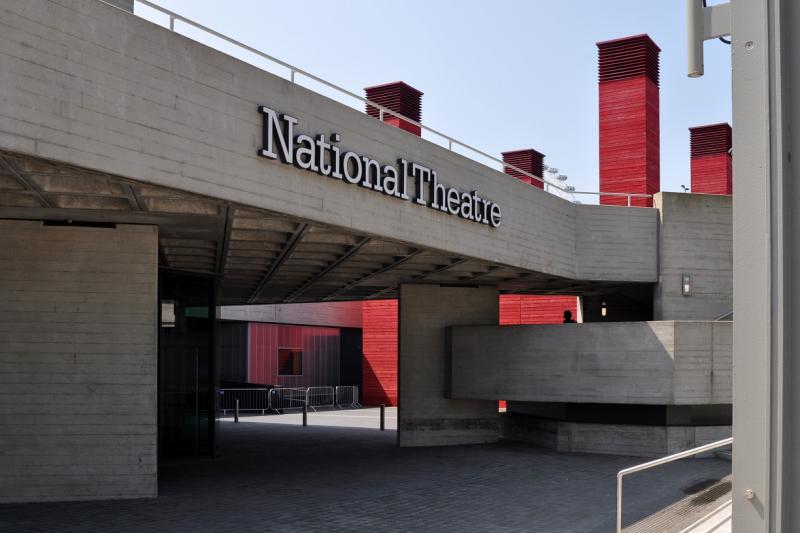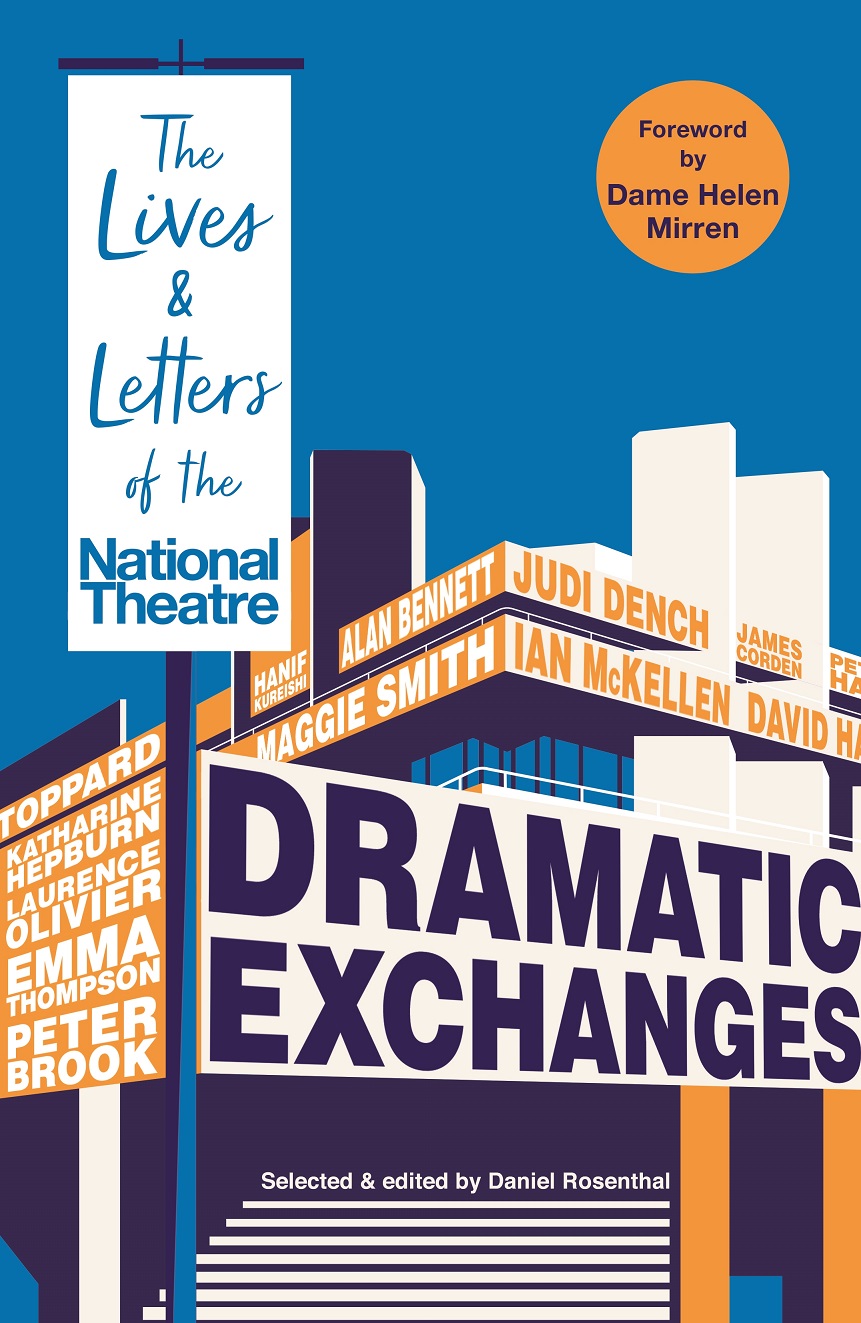Dramatic Exchanges review - a brilliant slice of theatre history | reviews, news & interviews
Dramatic Exchanges review - a brilliant slice of theatre history
Dramatic Exchanges review - a brilliant slice of theatre history
A rich epistolary stage biography, ‘The Lives and Letters of the National Theatre'

Dramatic Exchanges is a dazzling array of correspondence, stretching over more than a century, between National Theatre people.
We witness its remarkable talents hard at work, but also happily finding time to snipe, grumble, feud – and carry on; they do hurt feelings, paranoia and betrayed promises with élan, too. As editor Daniel Rosenthal (pictured below left) tells us, the interchanges show us all the ways in which the demands of art, commerce, friendship and ambition can be reconciled for the good of the ultimate goal, which is, of course, the play and its successful performance. Rosenthal has chosen 800 pieces of correspondence from some 12,000 in the NT’s own archive and elsewhere to cover the story of six decades of argy-bargy before the appearance of Olivier at the Old Vic, followed by the successive tenures, on the South Bank, of Peter Hall, Trevor Nunn, Richard Eyre, Nicholas Hytner and current incumbent Rufus Norris.
 Countless letters, telegrams, emails, postcards and memos illuminate the hitherto hidden backstage history of the NT, all accompanied by relevant photographs and illustrations. Excellently designed, it is a hefty collection with a wealth of observations and arguments, discussions and flare-ups between playwrights and actors, directors and producers, publishers, agents, critics, trustees and associated grandees. It all goes to show the various processes and methodologies – creative, hilarious, painful, hard-work – of getting the best possible production up and running.
Countless letters, telegrams, emails, postcards and memos illuminate the hitherto hidden backstage history of the NT, all accompanied by relevant photographs and illustrations. Excellently designed, it is a hefty collection with a wealth of observations and arguments, discussions and flare-ups between playwrights and actors, directors and producers, publishers, agents, critics, trustees and associated grandees. It all goes to show the various processes and methodologies – creative, hilarious, painful, hard-work – of getting the best possible production up and running.
Some samples: Noel (Coward, of course, nickname Noelie) writes to Larry-boy (Olivier, as if you didn’t guess) that his doctor says he can’t take on directing Hay Fever, although the play is one of his favourite pets. But Coward relents, as does Edith Evans (who thought she was too old), and off it goes at the Old Vic in 1963. That venue, and then its neighbour the Young Vic, were the first theatres to be designated “National” during the wait for permanent, purpose-built headquarters.
In 1974, 13 artistic directors of other theatres, including Richard Eyre, then running Nottingham, protested vehemently in a letter to the Times at what they saw as the National’s monopoly of funds, which starved other subsidised theatres. Peter Hall sent Eyre a post card: “I’m fed up with people like you praising the NT to my face and doing dirt behind my back.” Plus ça change...
In 1978, there were paeans of praise for Harold Pinter on his most conventional play, Betrayal, from all sorts or people, including his mother-in-law Elizabeth Longford, Mike Nichols and Edna O’Brien (no replies are printed). Judi Dench wrote to David Hare in 1990 to tell him his Racing Demon is probably one of the best plays she has ever seen, and she feels so jealous she “could SPIT”.
 The playwrights needed continual nourishment and comfort. Alan Bennett and Nick Hytner wrote continually to one another about the workshops, scripts and productions of all of Bennett’s plays. In 1991, Bennett – surely the most charming neurotic in the business – wrote to Richard Eyre that he “saw in the paper George III was playing to 99% capacity. Typically I started worrying about the other 1%.” In 1993, Tony Kushner expressed agonies about his difficulties in finishing Perestroika, the second part of Angels in America.
The playwrights needed continual nourishment and comfort. Alan Bennett and Nick Hytner wrote continually to one another about the workshops, scripts and productions of all of Bennett’s plays. In 1991, Bennett – surely the most charming neurotic in the business – wrote to Richard Eyre that he “saw in the paper George III was playing to 99% capacity. Typically I started worrying about the other 1%.” In 1993, Tony Kushner expressed agonies about his difficulties in finishing Perestroika, the second part of Angels in America.
The prologue of Dramatic Exchanges takes us from 1906, when the idea of a National Theatre was first mooted, to 1963 when it began to take tangible shape under the leadership of Olivier at the Old Vic; his lordship dedicated an arduous decade to fulfilling the dream, putting that ambition above his own career. Then it’s on to the negotiations for the South Bank, with the opening of the Olivier (its machinery still not functional) in 1976 the last piece of the puzzle. There are exchanges about projects that never reached fruition, plays that were never completed, or which failed to meet the NT’s needs. Mistakes were made: Julian Mitchell’s Another Country was turned away and launched elsewhere, starting the careers of Kenneth Branagh, Rupert Everett and Daniel Day-Lewis.
We are taken through it all year by year, production to production, each play festooned with conversations in epistolary form around its trajectory from script to performance. Each is introduced with a succinct history, including numbers of performances and almost compete cast lists, so we know exactly where we are, helping the reader assimilate a barrage of facts (and opinions) with remarkable ease.
Rosenthal’s short notes for each episode are invaluable, as is a fine index. Appendices include lists of all the authors of these communications, from world-famous actors to those just starting out, via directors, crucial literary managers and a plethora of others. Omitted from the compilation are designers (both lighting and set), composers, coaches and choreographers – were they really not wordsmiths? It’s a vivid and highly individual history, one that reminds us how it is the meshing of personality and talent that produces the goods.
- Dramatic Exchanges, selected and edited by Daniel Rosenthal (Profile, £25)
rating
Share this article
The future of Arts Journalism
You can stop theartsdesk.com closing!
We urgently need financing to survive. Our fundraising drive has thus far raised £49,000 but we need to reach £100,000 or we will be forced to close. Please contribute here: https://gofund.me/c3f6033d
And if you can forward this information to anyone who might assist, we’d be grateful.

Subscribe to theartsdesk.com
Thank you for continuing to read our work on theartsdesk.com. For unlimited access to every article in its entirety, including our archive of more than 15,000 pieces, we're asking for £5 per month or £40 per year. We feel it's a very good deal, and hope you do too.
To take a subscription now simply click here.
And if you're looking for that extra gift for a friend or family member, why not treat them to a theartsdesk.com gift subscription?
